Revolutionizing Sanitation
Revolutionizing Sanitation: The Power of Decentralised Wastewater Treatment Systems
In the quest for sustainable urban and rural sanitation, Decentralised Wastewater Treatment Systems (DEWATS) stand out as a beacon of hope. These systems, designed to treat wastewater at or near the source, offer a pragmatic and eco-friendly solution to the challenges posed by traditional centralized sewage treatment facilities.
What are DEWATS?
DEWATS encompass a variety of treatment solutions including biogas digesters, septic tanks, constructed wetlands, and ponds. They are particularly advantageous in areas where the infrastructure for centralized treatment is too costly or impractical. By leveraging locally available materials and modular designs, DEWATS ensure that wastewater treatment is accessible, affordable, and adaptable to community needs.
Why Decentralised?
The decentralised approach to wastewater treatment is not just about managing waste; it’s a holistic method that protects public health, conserves the natural environment, and addresses the unique challenges of different communities. Unlike centralized systems, which require extensive infrastructure and significant energy consumption, DEWATS operate efficiently without electricity and chemicals, making them ideal for sustainable development.
Benefits of DEWATS
- Eco-Friendly: By treating wastewater close to its source, DEWATS prevent the pollution of water bodies and reduce the ecological footprint of sanitation services.
- Cost-Effective: With low operational and maintenance costs, DEWATS are economically viable for communities of all sizes.
- Adaptable and Scalable: The modular nature of DEWATS allows for easy expansion to meet the growing needs of communities.
- Resource Recovery: DEWATS can facilitate the recovery of resources such as biogas, contributing to a circular economy.
The Impact of DEWATS
In developing countries, where access to safe sanitation remains a critical challenge, DEWATS have emerged as a game-changer. They not only provide a reliable solution to wastewater treatment but also enhance public health, environmental protection, and sustainable development.
Conclusion
Decentralised Wastewater Treatment Systems represent a significant advancement in our approach to sanitation. By adopting DEWATS, communities worldwide can take a significant step towards achieving water security, public health, and environmental sustainability. As we move forward, the role of DEWATS in shaping a cleaner, greener future cannot be overstated.




